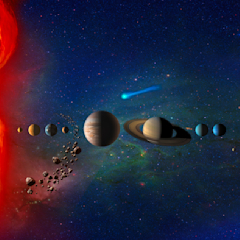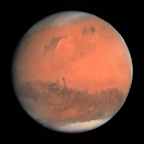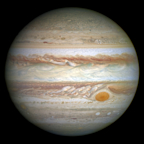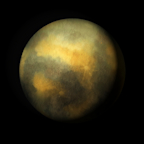Ads
related to: solar systemenergybillcruncher.com has been visited by 10K+ users in the past month
Search results
Results From The WOW.Com Content Network
The Solar System is the gravitationally bound system of the Sun and the objects that orbit it. It was formed 4.6 billion years ago when a dense region of a molecular cloud collapsed, forming the Sun and a protoplanetary disc.
Formation and evolution of the Solar System. Artist's conception of a protoplanetary disk. There is evidence that the formation of the Solar System began about 4.6 billion years ago with the gravitational collapse of a small part of a giant molecular cloud. [1] Most of the collapsing mass collected in the center, forming the Sun, while the rest ...
The Sun is the star at the center of the Solar System. It is a massive, nearly perfect sphere of hot plasma, [18] [19] heated to incandescence by nuclear fusion reactions in its core, radiating the energy from its surface mainly as visible light and infrared radiation with 10% at ultraviolet energies.
This article includes a list of the most massive known objects of the Solar System and partial lists of smaller objects by observed mean radius. These lists can be sorted according to an object's radius and mass and, for the most massive objects, volume, density, and surface gravity, if these values are available.
Discovery and exploration of the Solar System. True-scale Solar System poster made by Emanuel Bowen in 1747. At that time, Uranus, Neptune, nor the asteroid belts have been discovered yet. Discovery and exploration of the Solar System is observation, visitation, and increase in knowledge and understanding of Earth 's "cosmic neighborhood". [1]
The following outline is provided as an overview of and topical guide to the Solar System: Solar System – gravitationally bound system comprising the Sun and the objects that orbit it, either directly or indirectly. Of those objects that orbit the Sun directly, the largest eight are the planets (including Earth), with the remainder being ...
The Solar System Portal. The Sun and planets of the Solar System (distances not to scale) The Solar System is the gravitationally bound system of the Sun and the objects that orbit it. It was formed 4.6 billion years ago when a dense region of a molecular cloud collapsed, forming the Sun and a protoplanetary disc.
According to the IAU definition, there are eight planets in the Solar System, which are (in increasing distance from the Sun): [1] Mercury, Venus, Earth, Mars, Jupiter, Saturn, Uranus, and Neptune. Jupiter is the largest, at 318 Earth masses, whereas Mercury is the smallest, at 0.055 Earth masses.
Historical models of the Solar System. Approximate sizes of the planets relative to each other. Outward from the Sun, the planets are Mercury, Venus, Earth, Mars, Jupiter, Saturn, Uranus and Neptune. Jupiter's diameter is about 11 times that of the Earth's and the Sun's diameter is about 10 times Jupiter's.
This is a timeline of Solar System exploration ordering events in the exploration of the Solar System by date of spacecraft launch. It includes: All spacecraft that have left Earth orbit for the purposes of Solar System exploration (or were launched with that intention but failed), including lunar probes. It does not include:
Ads
related to: solar systemenergybillcruncher.com has been visited by 10K+ users in the past month


















